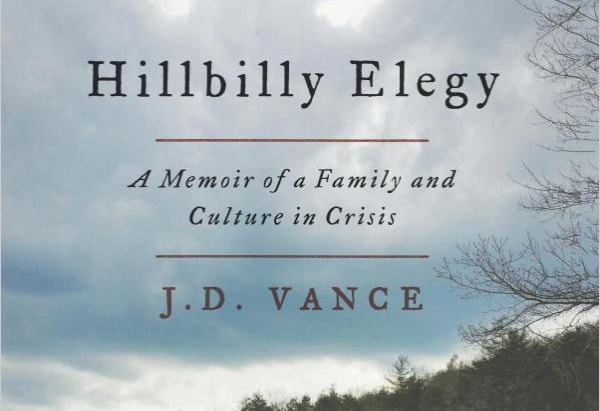[vc_row][vc_column width=”1/4″][vc_column_text] [/vc_column_text][/vc_column][vc_column width=”3/4″][vc_column_text]
[/vc_column_text][/vc_column][vc_column width=”3/4″][vc_column_text]
Hillbilly Elegy
A Memoir of a Family and Culture in Crisis
J.D. Vance
Harper Collins, 264 pages
[/vc_column_text][vc_column_text]
Reviewed by Rachel Jurkowski Burgoyne | April 25, 2018
[/vc_column_text][/vc_column][/vc_row][vc_row][vc_column][/vc_column][/vc_row][vc_row][vc_column][vc_column_text]
J.D. Vance’s much talked-about book has been on my reading list for a year now, and it was definitely worth the wait. I wanted to read Hillbilly Elegy primarily for two reasons. 1) It explores the challenges blue-collar America is facing in our post-industrial context, and as a woman from a blue-collar town in western New York, I felt drawn to this theme. And 2) it provides a deeply personal window into the disillusionment many white working-class people feel during this polarized time in our nation.
From the start Vance explains that his book was not crafted to convince anyone that a problem exists within the white working class in America. Nor does he pretend to know the key to solving any such problems. His purpose is to tell his own story of being born into a troubled culture undergoing seismic changes and struggling to adapt.
Vance weaves a tale of his family’s journey from the Appalachian Mountains of southeastern Kentucky to southwestern Ohio in search of better jobs and a brighter future. He brings readers deep into the hillbilly culture of the mainly Scots-Irish immigrants who settled in Appalachia—their values of loyalty, dedication to country and family, and deep faith, as well as a sharp distrust of outsiders and a combativeness when honor is at stake. And when many of these people became part of the post-WWI and WWII migrations to industrial areas in the Midwest and East Coast, they brought their values with them.
The book transitions in and out of Vance’s family’s struggles—reflecting those of many other “hill people”—as they try to assimilate to their new lives. The isolation of the suburbs, the loss of support networks, and efforts to achieve the American dream took their toll—especially when industrial jobs began disappearing. His character sketches of his family make you empathize with each of them, from his drug-addicted and manipulative yet wounded mother to his tough-as-nails, foul-mouthed but soft-hearted grandmother. Vance balances an openness to people’s faults and failings with his acknowledgment of the obstacles that block his family’s ability to function well in their new context.
Ultimately, he paints a picture of a tough, insular group of people who bought the American dream hook, line, and sinker—only to get left behind when the economy no longer valued their labor. The white working class in America is still reeling from the perceived betrayal of what they were promised, and Vance offers some suggestions for how to move forward—but again, this book is not about putting forward solutions. It’s really about inviting the reader into his story and culture.
I recommend this book to anyone seeking to better understand the struggle and anger of white working-class Americans in today’s context. With open ears and a willingness to share our stories and problems, perhaps we can move toward a better future together.
[/vc_column_text][/vc_column][/vc_row]














